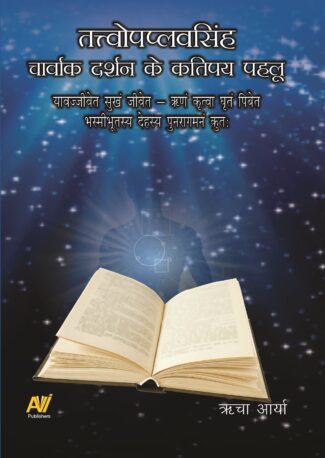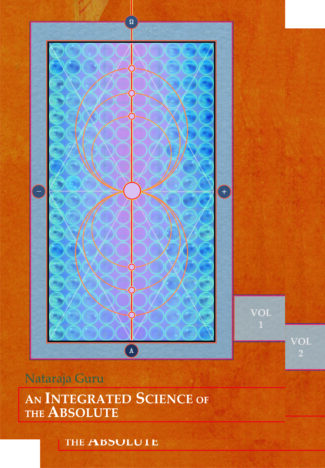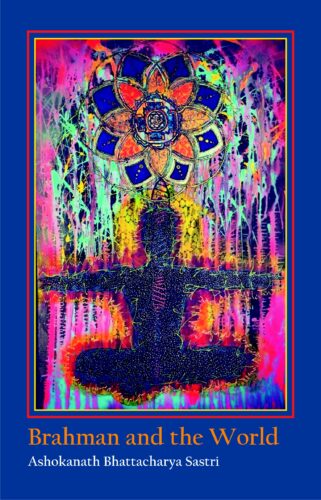

Nectar Words of My M...
Nectar Words of My Master
by: Puja (Valentine Teisseire)Are you faced with negative emotions such as jealousy, anger or pride? The only way to overcome these is by following the teachings of a Guru. Here is a beautiful book containing 108 teachings of a Sadguru which will lead you on the divine path.
₹199.00 Original price was: ₹199.00.₹179.00Current price is: ₹179.00.
ISBN: 9788124604748
Year Of Publication: 2008
Edition: 1st
Pages : 165
Bibliographic Details : Glossary
Language : English
Binding : Paperback
Publisher: D.K. Printworld Pvt. Ltd.
Size: 23 cm.
Weight: 250
The Nectar Words of My Master is a mala of 108 teachings, offered by an enlightened Master, that can be used as a day-by-day practical guide for spirituality. It deals with the trials of the human soul, when faced with negative emotions such as jealousy, anger or pride, and proposes a path towards the Light based on divine qualities and spiritual practice. Sri Sri Sadguru Swami Advaitananda Paramahansa always conveys eternal truth through simple speech, whenever He is being questioned by sincere seekers.
- Sale!Tattvopaplavasimha Carvaka darasana ke katipaya pahalu (???????????????? ??????? ????? ?? ????? ????) by: Richa Arya
₹795.00Original price was: ₹795.00.₹716.00Current price is: ₹716.00.Jayarashibhatta’s Tattvopaplavsimha (ca. 8th cent.) is considered to be an important work of the Caravaka (Charvak) philosophy. The Charvak philosophy rejects evidence other than the direct evidence, to the extent that it does not consider sky as an element in the five fundamental elements (earth, water, fire, air and sky). The manuscript of Tattvopaplavisimha was obtained from Patan (modern-day Patna) in 1926. It was published in the Oriental Series in 1940 and with an introduction in Hindi by Pandit Sukhlal Sanghvi in 1987. The historical work examines the definitions of the evidence as accepted by various arms of Indian philosophy. The present book reviews the refutation of various epistemological principles explained in Tattvopaplavsimha.जयराशिभट्ट कृत तत्त्वोपप्लवसिंह (आठवीं शताब्दी) चार्वाक दर्शन का ग्रन्थ माना जाता है। चार्वाक दर्शन प्रत्यक्ष प्रमाण के अतिरिक्त सभी प्रमाणों को अस्वीकार करता है, इसके साथ ही प्रत्यक्ष को ही एकमात्र प्रमाण मानने के कारण चार्वाक पंचतत्वों (पृथ्वी, जल, अग्नि, वायु एवं आकाश) में आकाश तत्त्व को नकारता है। तत्त्वोपप्लवसिंह ग्रन्थ की पाण्डुलिपि सन 1926 में पाटन से प्राप्त हुई। सन 1940 में ओरियंटल सीरीज में तथा 1987 में पंडित श्री सुखलाल जी सांघवी की हिंदी भूमिका के साथ प्रकाशित हुआ। यह ग्रन्थ वैतण्डिक पद्धति होने के कारण भारतीय दर्शन के विभिन्न सम्प्रदायों द्वारा स्वीकृत प्रमाणों की परिभाषाओँ और प्रमाण की परीक्षा करता है। प्रस्तुत पुस्तक में तत्त्वोपप्लवसिंह में व्याख्यायित विभिन्न ज्ञानमीमांसीय सिद्धांतों के खंडन की समीक्षा की गयी है।
- Sale!An Intergrated Science of the Absolute (2 Vols. Set) by: Nataraja Guru
₹3,000.00Original price was: ₹3,000.00.₹2,700.00Current price is: ₹2,700.00.It is not just the magnum opus, but a truly monumental effort of a scientist-philosopher who has spent a whole lifetime to formulate a unitive science, wherein all disciplines of human questing could find a common ground a science where modern science and ancient spiritual wisdom could meet and merge like two opposite poles of a magnet. As a direct disciple of one of the great rishis of the modern age, Nataraja Guru discovers this common ground in Brahma-vidya, which he calls the Integrated Science of the Absolute, and which has, at its base, his Gurus Dars?ana Mala.
A string of hundred Sanskrit verses, composed by the mystic-poet, Narayana Guru (18541928), the Darsana Mala is the very epitome of all visions of truth inspired by his remarkable acquisitions of Upanisadic thought and, yet far more, by his own tapas (mystical discipline). Reproducing these highly significative verses in Roman script, along with English translations, word meanings, and extensive commentaries, Nataraja Guru not only spells out his mentors Visions of the Absolute in contemporary idiom, but also shows how these visions are fully validated by modern science.
Eclectic synthesis of varied scientific disciplines into a systematic whole is not all that Nataraja Guru accomplishes here. Rather, his book (now in third edition) is an attempt to reintroduce Brahma-vidya as the one Master Science that embraces every branch of science, every human interest. - Sale!Brahman and the World by: Ashokanath Battacharya Sastri
₹500.00Original price was: ₹500.00.₹450.00Current price is: ₹450.00.“The Vedānta has been rightly called the Finest Fruit of Indian Thought and the Upaniṣads as the Finer Flowers. Vedānta grows out of the teachings of the Upaniṣads and passes into the various systems in the writings of Śaṅkara, Bhāskara, Rāmānuja, Madhva and Vallabha, the great founders of Advaita, Bhedābheda, Viśiṣṭādvaita, Dvaitādvaita and Śuddhādvaita, respectively. However, there is a perception among Orientalists that while the Upaniṣads favour the Monistic doctrine, Bādarāyaṇa’s Brahmasūtra fundamentally opposes it on some of the most crucial points.
The book thus delves deep into the philosophies of both Bādarāyaṇa and Śaṅkara in enunciating the essential features of Brahman and Its association with the world. It thus discusses topics such as what sort of cause Brahman is?, and what sort of material causality is to be ascribed to It? It also addresses the conflicting views on the nature of Brahman like that of Vivarttavāda and of Rāmānuja’s Saguṇa-Brahman.
This book proposes to take up the question of Universal Causation to examine thoroughly as how far it is right to regard Brahman as the Universal Cause and how far sūtrakāra himself lent his support to each of the inter-conflicting schools of Vedānta. This book should, therefore, benefit all who are devoted to the philosophic teachings of Advaita Vedānta and its preceptors.” - Sale!Vedanta Science and Technology: A Multidimensional Apporoach by: Girish Nath Jha, Bal Ram Singh, Sukalyan Sengupta,
₹3,000.00Original price was: ₹3,000.00.₹2,700.00Current price is: ₹2,700.00.Vedānta texts have been well known for their richness in fundamental scientific and technological principles with strong potential for research and development today. In fact, much of ancient India’s remarkable achievements in science and technology can be credited to Vedantic texts.
This volume – proceedings of the 22nd International Congress of Vedanta held during 27-30 December 2015 at Jawaharlal Nehru University, New Delhi – features 53 scholarly articles from a wide variety of areas of study. The 22nd Vedanta was a confluence of scholars from various disciplines and the papers in this volume bear the imprint of an intense discussion that is usually expected from a good Vedanta seminar. Though the majority of the papers are in English, a few are in Sanskrit and Hindi as well. The papers are grouped under Vedānta Studies, Vedānta and Philosophy, Vedānta and Science, Vedānta and Culture, Applied Vedānta, and Digital Access and Search of Sanskrit Texts.
This multidimensional approach extends the core scientific ideas of Vedānta to social, cultural, aesthetic and religious aspects of studies, creating a wide spectrum of intellectual discourse and trying to discover fundamental scientific and technological aspects of Vedānta studies.
Being a worthwhile addition to Vedānta studies, this volume should invoke keen interest among all those who are deeply into it, be a student, a researcher or a common reader. - Sale!An Introduction to Jain Philosophy by: Parveen Jain
₹1,600.00Original price was: ₹1,600.00.₹1,440.00Current price is: ₹1,440.00.It is well-known that the Jain tradition has been extremely influential in the development of Indian thought and culture. The Jain tradition teaches that there is an interdependence of perception, knowledge, and conduct unified by an axiomatic principle of non-violence in thought, speech, and action. In this way, non-violence defines the core of the Jain tradition, which has had a profound effect on other dharmic traditions originating in India. Jain Dharma is so significant that in some ways it may be incomplete to attempt to understand other Indian traditions (such as Buddhism or Hinduism) without knowing the basics of the Jain tradition, since these other traditions developed in an ongoing dialogue with the insights and wisdom of Jain respondents and visionaries.
This book enables the reader to enjoy a comprehensive journey into the intricate world of Jain thought and culture in a way that is philosophical in its compelling rationality, deeply spiritual in its revelations, yet accessible in its language. The organization of this book allows the reader to engage in an overview of the central teachings of the Jain tradition, but also to ascertain the profundity of its depths. It can be read with equal efficacy in succession from beginning to end, or pursued by individual topics of interest to the reader. Either strategy will have the same effect: a systematic understanding of what the timeless teachings of Jain thinkers have to say about the universal issues of the human condition – and how we might understand our harmonious relationship with other living entities as a powerful and effective spiritual journey.







